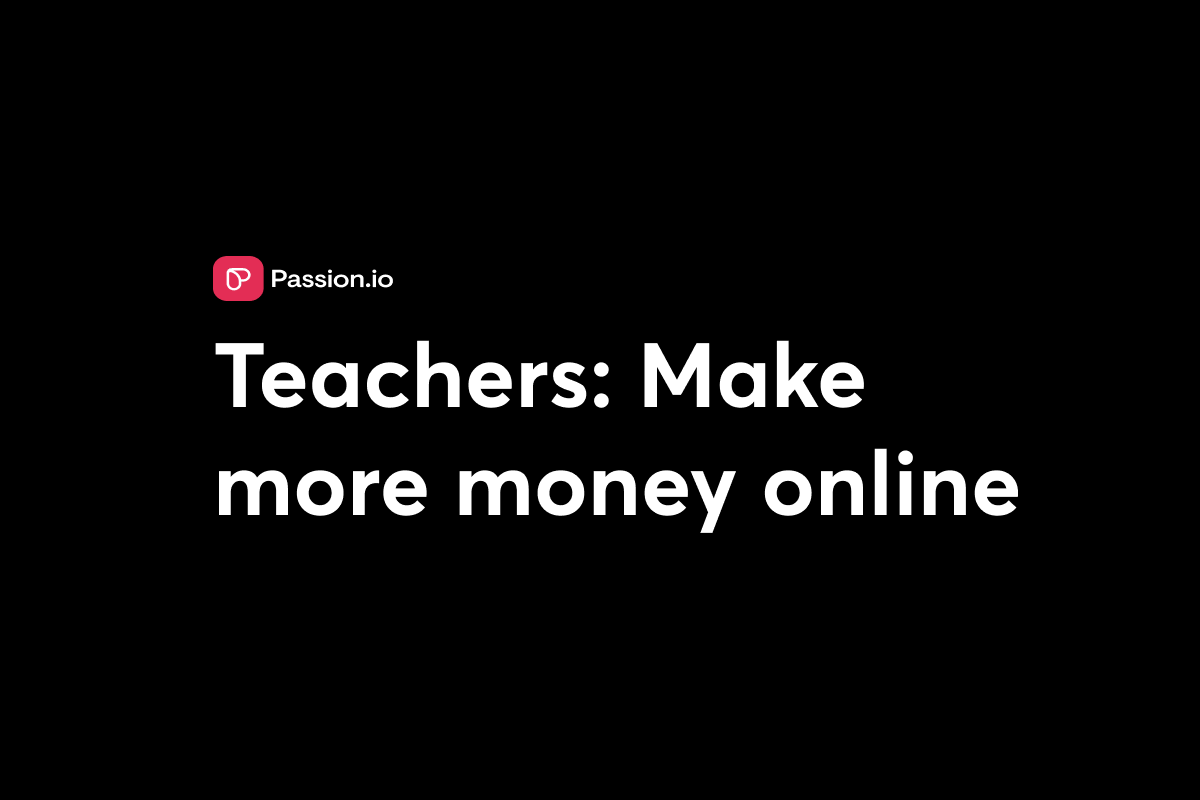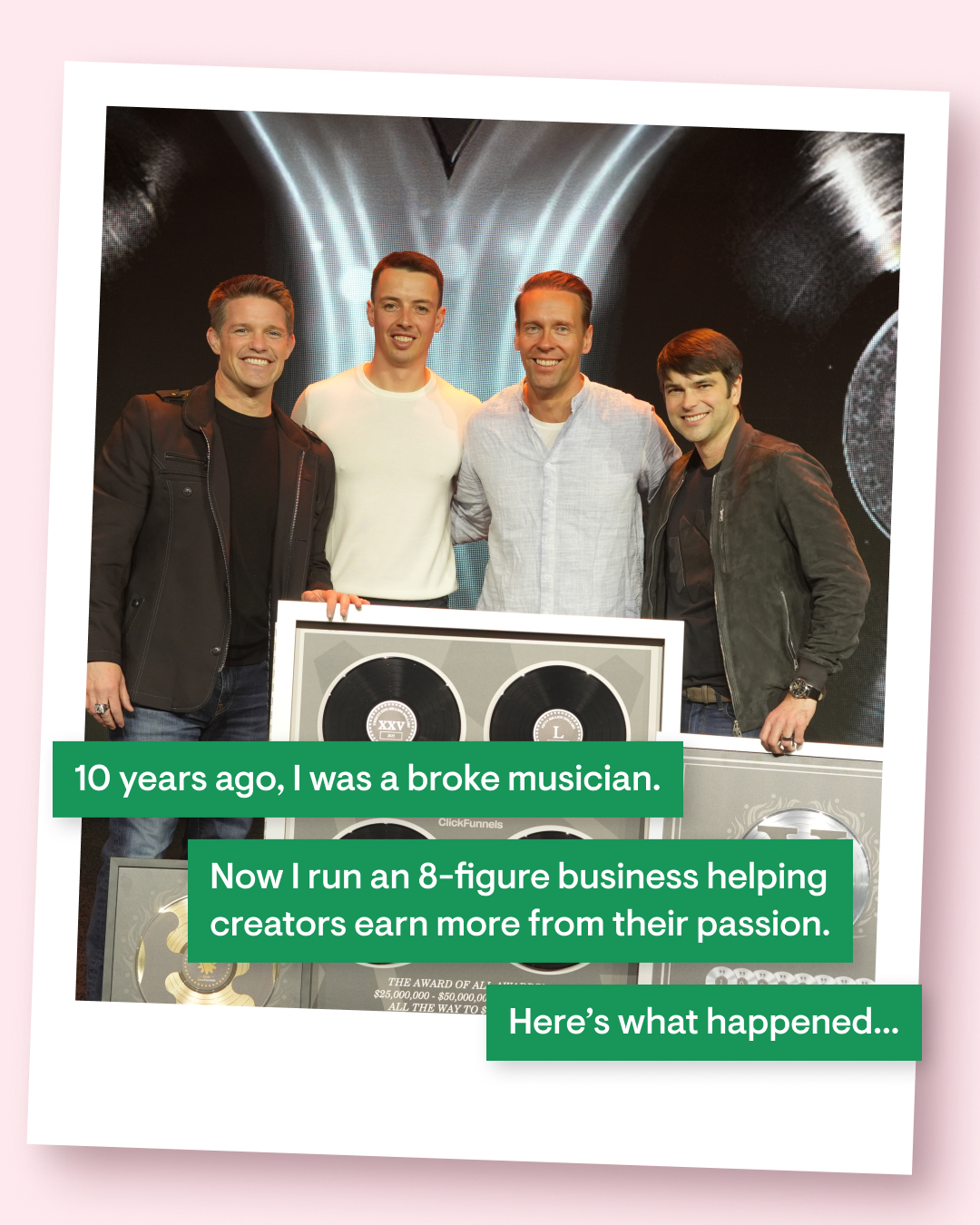Updated 10th November, 2025
Your classroom expertise translates directly into online income streams beyond traditional tutoring. Teachers successfully monetize specialized knowledge through niche courses, membership communities, and digital resource libraries. The challenge isn't your teaching ability, it's avoiding the chaos of scattered tools and platform dependency.
A branded mobile and web app consolidates content, community, and payments into one professional hub. You own the audience data, control the experience, and use push notifications to drive engagement. This guide shows how to build four high-potential income streams with a no-code platform.
Why Teachers Are Uniquely Positioned for Online Success
Your classroom experience provides transferable skills that many online entrepreneurs lack: curriculum design, clear communication, empathy for learner struggles, organization, and adaptability.
The demand for specialized knowledge
Online learning extends far beyond traditional academics. A music teacher monetizes guitar fundamentals. A science teacher packages STEM projects for homeschoolers. An ESL instructor creates interactive grammar programs for adult learners. Teachers create digital resources like interactive worksheets and specialized curriculum units for non-traditional markets including homeschool families, adult learners, and professional development.
The market rewards specificity. Instead of competing with free YouTube videos on "math help," build a targeted app for "visual learners struggling with algebra word problems." This precision attracts paying customers who need exactly what you offer.
Transferable skills that drive online success
Five core teaching skills translate directly to online entrepreneurship:
- Curriculum design: Structure information logically and create engaging materials. Drag-and-drop course builders let you organize videos, PDFs, and audio into learning paths.
- Communication: Explain complex ideas through video, writing, and live interaction for compelling lessons and sales copy.
- Empathy: Identify learner struggles and adapt to different styles, helping you pinpoint profitable niches and solve real problems.
- Organization: Manage multiple responsibilities efficiently, essential for juggling content creation, marketing, and customer support.
- Adaptability: Think on your feet and pivot based on feedback, critical for evolving your online business.
The Problem with "Rented Land" and Scattered Tools
Most teachers patch together Instagram for visibility, Facebook Groups for community, Zoom for sessions, and Stripe links for payment. This creates three critical problems.
- Algorithm risk: Educational content creators report that platform algorithm changes force them to constantly chase new tactics. One Facebook update can cut your reach in half overnight. You don't own those relationships, the platform does.
- Low engagement rates: Email averages 20-25% open rates. Facebook posts reach 5-10% of your group organically. Generic course platforms lack mobile-first engagement tools, so students download a PDF, watch one video, then forget about your content.
- Tool chaos: Teachers trying to scale describe switching between Instagram DMs, Facebook Groups, Zoom, Stripe, and course platforms. Members can't find links. Payments fail unnoticed. Questions appear in three places. Every hour managing tools is an hour not teaching.
- Before and After: Scattered tools → Unified app. Content split across platforms → Centralized hub. No push notifications → Direct mobile engagement. Algorithm-dependent reach → Owned audience relationships.
Top Creative Online Income Ideas for Teachers
Teachers can build diverse digital offerings that generate recurring revenue. Here are four high-potential income streams with specific implementation strategies.
1. Niche Skill-Based Courses and Challenges
Move beyond broad courses to laser-focused programs. A "30-Day Guitar Basics Challenge" or "Physics Exam Prep for AP Students" promises a specific transformation in a defined timeframe.
Example content: A music teacher creates a 30-day guitar challenge with daily video lessons, audio practice files, and downloadable tablature. Members share progress in a community channel. Price at $97 one-time or $29/month. Target 15-30% completion in 90 days with weekly push reminders.
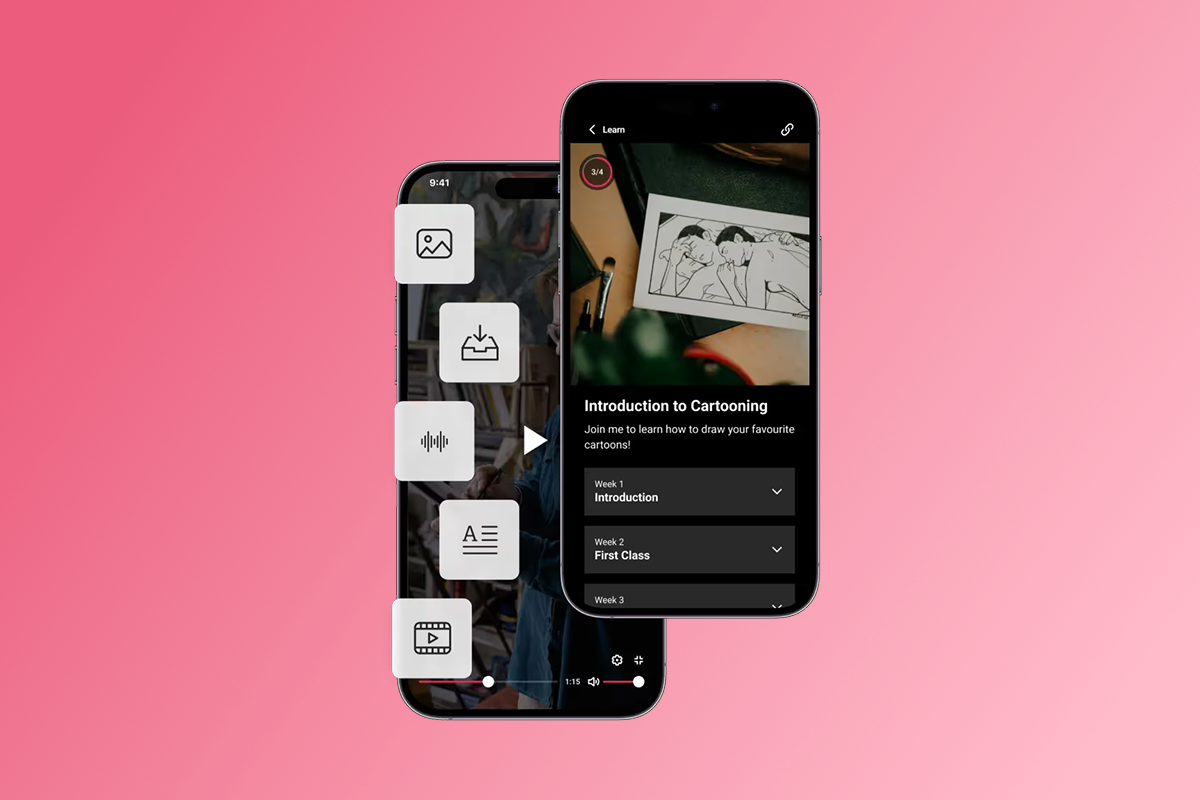
Platform features:
- Interactive lessons with videos, audio, PDFs, and quizzes via Typeform integration
- Timers for practice sessions and progress tracking to show advancement
- Drip content releases lessons over time to maintain engagement
- Offline downloads for learning without internet connection
Target audience: Individuals seeking structured skill development with accountability. Teachers successfully monetize specialized skills training through digital platforms.
2. Exclusive Membership Communities
Build recurring revenue through membership communities providing ongoing value through content libraries, live sessions, peer support, and direct access.
Example content: An elementary teacher creates a "Creative Lesson Plan Hub" for fellow educators at $49/month. Members access downloadable lesson plans, printable activity sheets, video tutorials on classroom management, and a private community channel to exchange ideas.
Platform features:
- In-app community channels create distraction-free spaces for member connection
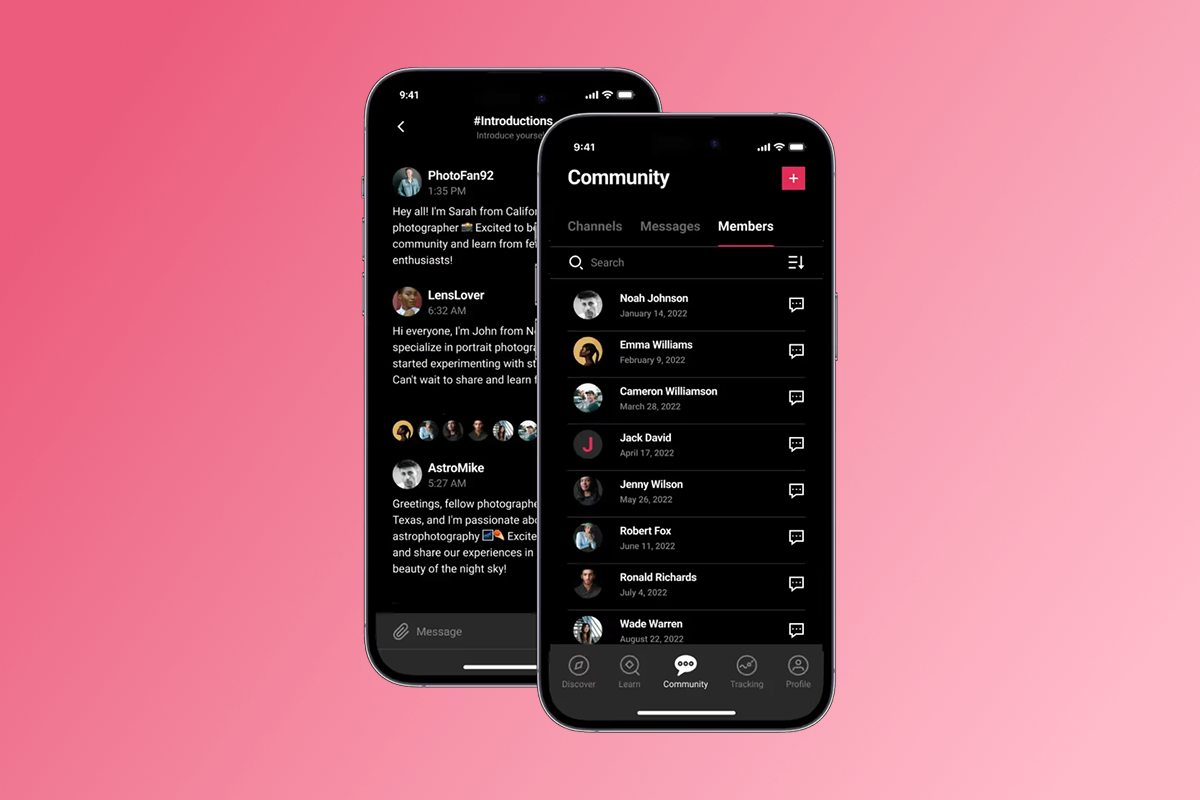
- Moderate conversations, pin important posts, and tag members to focus discussions
- Direct messaging between members for networking and peer support
- Live streaming integration via YouTube for Q&A sessions and workshops
Monetization: Offer monthly ($49) and annual ($490, saving $98) subscriptions. Use freemium with one free mini-course to attract members, then upsell to full membership. Target 30 paying members in Month 1, growing to 100+ by Month 6 ($4,900 MRR).
"I like that there's an easy to follow system to not only build your App but also your Business." - G2 review
3. Premium Resource Libraries and Digital Products
Teachers create and sell specialized digital resources like interactive worksheets, curriculum units, e-books, and custom workbooks. Your own app keeps 100% of customer relationships and reduces payment fees to 3.9% on web checkouts versus marketplace commissions of 15-45%.
Example content: An English teacher designs an "Interactive Grammar Workbook" where students watch video explanations, complete exercises, and upload writing samples for peer review. Sell individual workbooks for $35 or bundle five for $149.
Platform features:
- Centralized content library hosting videos, audio, PDFs, and text
- Goal tracking and progress bars for visual motivation
- File upload sections for student assignments and feedback
- Bundle creation for higher transaction value
Monetization: One-time purchases for individual resources ($25-50), bundles ($100-200), or unlimited library access at $29/month. Modern platforms support all these models with transparent fees.
4. Certification Programs and Professional Development
Teachers with specialized expertise create certification programs for fellow educators or professionals. These command premium pricing because they provide credentials and career advancement.
Example content: A technology specialist creates a "Digital Teaching Certification" with eight modules covering educational technology, online pedagogy, and engagement strategies. Include video lessons, case studies, assignments, live Q&A, and a final project. Award certificate upon completion.
Platform features:
- Multi-module structure with completion tracking to monitor progress
- Zapier integration for certificate automation or manual certificate delivery
- Calendly integration for scheduling live sessions
- Community channels for cohort discussion and peer learning
Monetization: Price certification at $297-797 based on depth. Offer payment plans (3 x $117 for a $347 course) to lower barriers. Use tiered pricing: basic certification $297, premium tier $497 includes six months of group coaching post-certification.
Educational entrepreneurship resources show growing demand for specialized teacher training outside traditional institutions.
How a Branded App Transforms Your Online Venture
Moving your teaching business to a branded mobile and web app solves platform dependency and tool sprawl while unlocking mobile-first engagement.
Own your audience and data
Social platforms or marketplaces own customer relationships and can change rules, raise fees, or shut down features without warning. Your app provides direct access to customer data, email addresses, and purchase history. If Instagram changes algorithms or Facebook modifies groups, your business continues running.
"Passion makes building your own e-learning app fast, simple, and stress-free...I was able to design, build, and launch a fully functional app in just a few hours—no tech experience required." - G2 review
Boost engagement with mobile-first features
Push notifications bypass email inboxes and social feeds, appearing on users' lock screens. Plan 2-3 notifications weekly during launch periods, scaling to 1-2 weekly for ongoing engagement. Offline content access allows downloading videos and audio for learning anywhere. In-app community channels create peer support networks that increase retention.
Streamline monetization
Integrated payment processing offers PassionPayments (3.9% platform fee plus Stripe) for web and Apple/Google IAP (15-30%) for mobile. Strategy: route high-ticket offers ($297+) through web checkout to preserve margin, enable IAP for monthly subscriptions under $50 where convenience drives conversions. Higher-tier plans support external checkout via Zapier with 0% platform fee.

Offer subscriptions, one-time purchases, freemium, and bundles from one platform.
Launching Your Teacher App: A 4-Week Path
Launch a functional branded app in 2-4 weeks without coding. Here's the practical timeline.
Week 1: Define your niche and content
Identify your profitable niche with three questions:
- What specific knowledge am I passionate about beyond traditional classroom teaching?
- What recurring problems have I observed that I'm uniquely qualified to solve?
- Can I clearly articulate my ideal customer? (demographics, online behaviors, willingness to pay)
Validate your niche by confirming people pay for solutions. Check online communities and note competitor pricing. Some competition validates demand. Look for gaps you can fill.
Inventory existing content: videos, lesson plans, worksheets. Repurpose what you have.
Weeks 1-2: Build your app with no code
- Day 1-3: Sign up for Passion and select the Launch plan ($99/month annually, 30-day money-back guarantee).
- Day 3-7: Use the drag-and-drop builder to select a template and customize with your logo, colors, and fonts. No technical skills required.
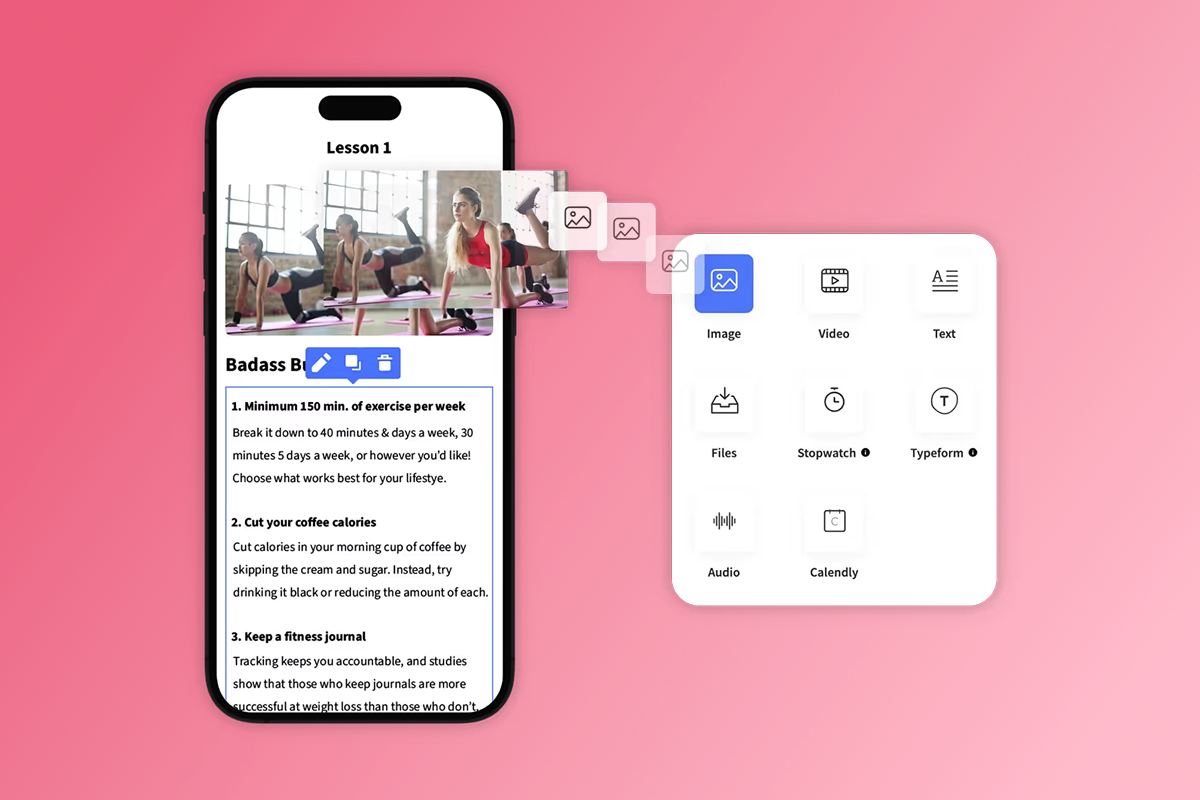
- Day 7-14: Upload content (videos, audio, PDFs, images, articles). Organize into courses or programs. Add quizzes via Typeform, timers, and progress tracking. Set drip schedules to release lessons over time.
"From all the app builders out there, this one offers the best value for money." - TrustPilot review
Week 2: Set up monetization and pricing
Define your strategy using common pricing models:
- Subscriptions: $19-79 monthly or 10-12x for annual (2 free months). Generates predictable MRR.
- One-time purchases: $47-297 for courses, $997-2,997 for high-ticket coaching.
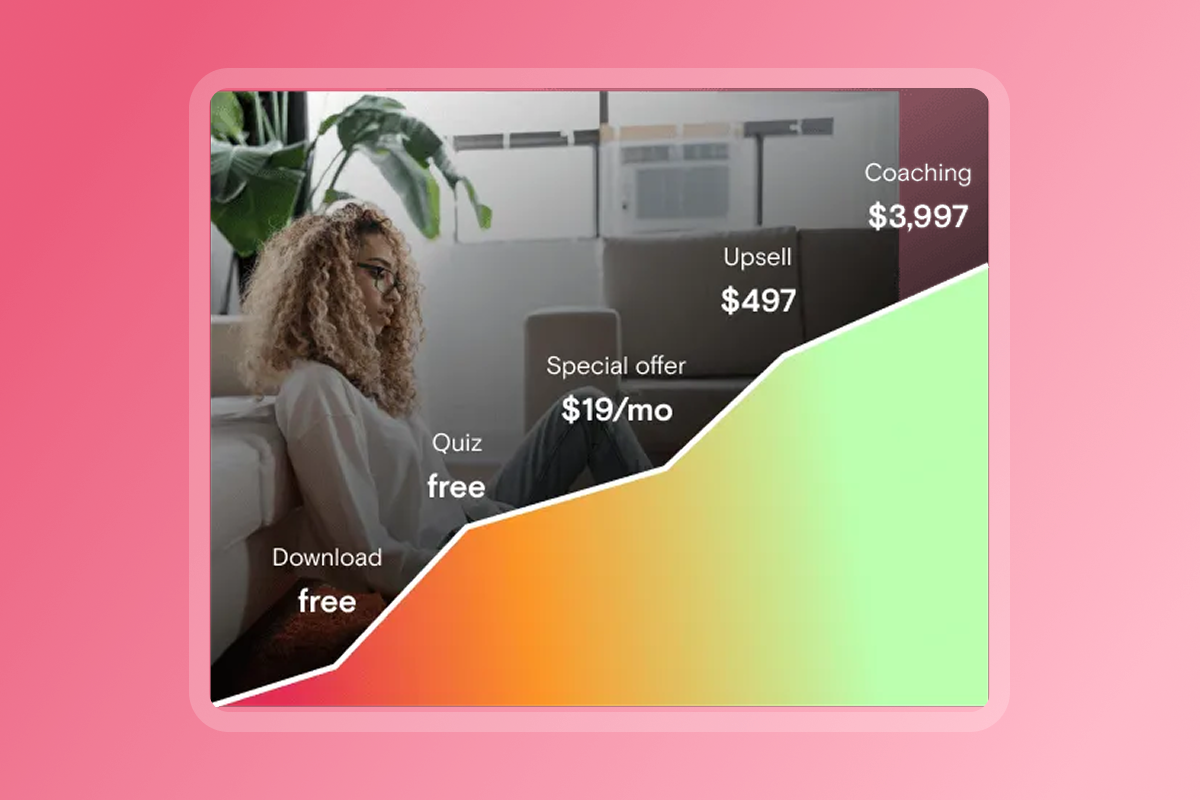
- Tiered pricing: Basic ($19/month), Premium ($49/month with community and live Q&A), VIP ($149/month with 1:1 support).
- Freemium: Basic content free, upsell premium features.
Set up PassionPayments for web (3.9% + Stripe) or enable IAP for Apple/Google (15-30%). Route high-ticket offers to web checkout to preserve margin.
Register for Apple Developer ($99/year) and Google Play ($25 one-time) if publishing to app stores.
Weeks 3-4: Launch and engage
Launch your web app immediately while app store submissions process (1-4 weeks). Drive existing audience from email and social to the web version.
Use push notifications for launch announcements, lesson reminders, and exclusive offers. Activate community channels for peer support. Launch challenges with leaderboards and daily check-ins.
Monitor app analytics: lesson completion rates, DAU/MAU, churn, and MRR. Use this data to refine content and engagement.
Plan tiers and what to expect

Passion offers four tiers:
Plus plan includes done-for-you build, submission, migration, success manager, and advanced analytics. Confirm current features at signup as plans evolve.
Risks and Mitigations
Address predictable risks proactively to avoid delays.
App Store review delays: Apple and Google manually review app submissions, which can take 1–4 weeks for initial approval. Mitigation: Passion allows you to launch your web app immediately, letting you engage your audience while the app stores process your submission. Their Expand plan includes submission support, streamlining approvals and minimizing delays.
Fee structure clarity: PassionPayments charges a 3.9% platform fee plus Stripe for web transactions, while Apple/Google retain 15–30% for in-app purchases (IAP). Mitigation: Passion gives you flexibility to optimize pricing and maximize margins. For example, route high-ticket offers ($297+) or bundles to web checkout to avoid app store fees, while lower-priced subscriptions can run via IAP seamlessly.
Security hygiene: Protecting accounts and customer data is critical. Mitigation: Passion provides clear security guidance, including 2FA, strong unique passwords, and controlled credential access, ensuring your app and customer data remain safe. Review Passion's security practices.
Real-World Success Stories
Teachers and educators across niches have used Passion to build profitable apps. Fitness coaches and skills trainers report six-figure months and mid-five-figure MRR through branded apps with courses, challenges, and communities. The Drummers Almanac provides specialized music education through a mobile app. Cirque+ teaches aerial arts with video lessons and supportive community.
"I have been wanting to join the Passion.io community for so long and I finally did. It is everything that I imagined. The training is amazing." - TrustPilot review
These examples prove specialized knowledge, packaged professionally with community support, generates sustainable recurring revenue. Teachers possess the same specialized knowledge and pedagogical skills.
Your path from classroom to online income takes 2-4 weeks with Passion. You have the content, teaching ability, and understanding of learner engagement. A branded mobile and web app packages this expertise professionally and generates predictable MRR. Target your first 50 subscribers in Month 1, growing to $2,000-5,000 MRR by Month 6.
Start with the Launch plan at $99/month annually, backed by a 30-day money-back guarantee. Build in weeks, not months. Route high-ticket offers through web checkout. Use push notifications to drive engagement and community channels to boost retention.
Your specialized knowledge is valuable. Instead of renting space on platforms that throttle reach and control relationships, build your teaching business on infrastructure you own and control.
Frequently Asked Questions
How fast can a teacher launch a branded app with Passion?
Web app live in 2 weeks, App Store submissions underway by week 3-4. Expand plan includes App Store submission support.
What are the main costs associated with launching an app?
Launch plan $99/month annually, PassionPayments 3.9% web fee plus Stripe, Apple/Google IAP 15-30%, Apple Developer $99/year, Google Play $25 one-time.
Can I offer both free and paid content in my app?
Yes. Freemium models provide basic content free with upsells to premium subscriptions or courses.
How do I choose between web checkout and IAP fees?
Use web checkout (3.9% plus Stripe) for high-ticket offers and bundles to preserve margin. Enable IAP (15-30%) for mobile convenience on subscriptions under $50/month.
How do I move my existing Facebook Group into my app?
Announce the transition with clear migration instructions. Offer exclusive content in the new app. Use push notifications to keep members engaged after they join.
Key Terms Glossary
Branded app: Mobile application (iOS/Android) and web app customized with your logo, colors, and content, published under your brand name.
Push notifications: Short messages sent directly to users' mobile devices from your app to drive engagement, even when the app is closed.
In-app community: Dedicated social space within your branded app where members interact and support each other without external platform interference.
PassionPayments: Integrated payment processing for web checkouts, with a 3.9% platform fee plus standard Stripe fees.
IAP (In-App Purchase): Purchases made within a native mobile app, subject to Apple/Google's 15-30% fees depending on revenue thresholds.
MRR (Monthly Recurring Revenue): Predictable revenue from subscriptions each month, providing business stability and growth visibility.
Drip content: Course material released gradually over time (daily, weekly) rather than all at once to maintain engagement.





